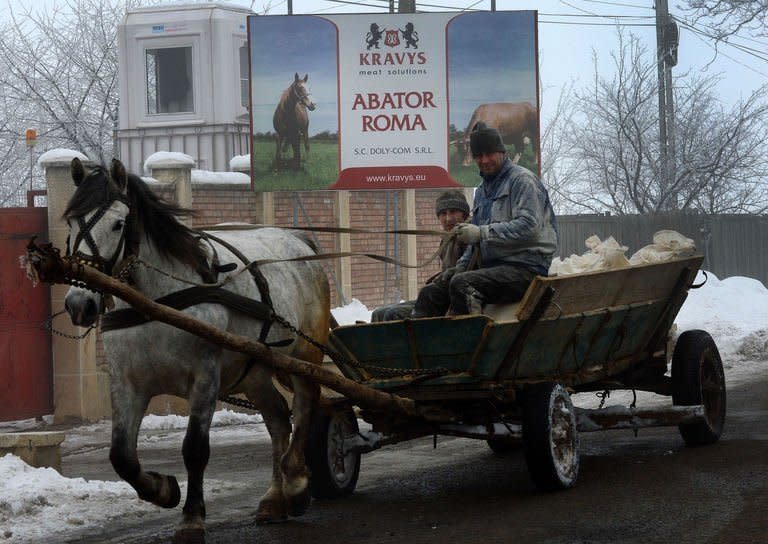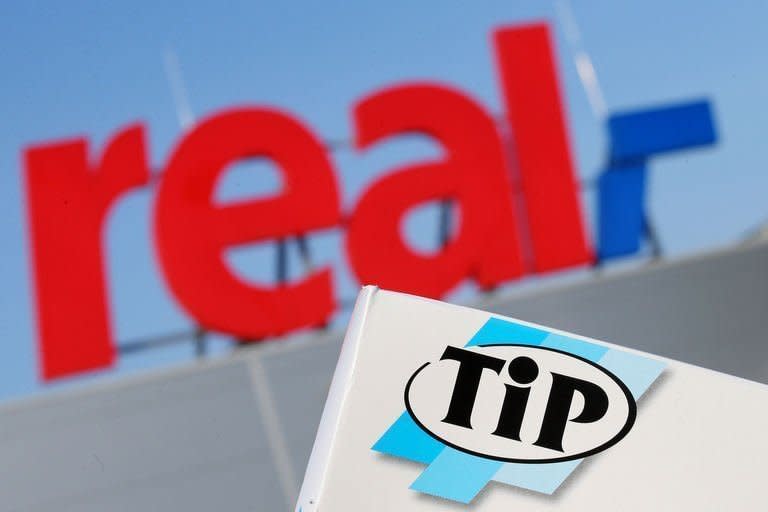Drug find stokes health fears in EU horsemeat scandal
Europe's scandal over horsemeat-tainted food spiralled Thursday after Britain announced that a potentially harmful drug had been found in horse carcasses sent to France. Britain's Food Standards Agency (FSA) said it had found traces of the equine drug phenylbutazone -- which can cause a serious blood disorder in humans in rare cases -- in six carcasses exported to France by British abattoirs. "Six were sent to France and may have entered the food chain," the FSA said in a statement after testing the carcasses of 206 horses slaughtered in Britain. "The FSA is gathering information on the six carcasses sent to France and will work with the French authorities to trace them." British officials stressed that the low levels of the drug found in the meat posed little risk to human health. Two supermarket chains in Germany, Real and Edeka, became the latest retailers embroiled in the widening scandal on Thursday when they revealed tests had discovered traces of horsemeat in lasagne meals which they had already withdrawn from sale. Supermarkets across Europe have pulled millions of frozen ready meals from the shelves since last week, after tests revealed that large quantities of horsemeat had made their way into products labelled as beef. Meanwhile tests by the FSA found no traces of phenylbutazone -- also known as bute -- in products made by frozen food giant Findus, whose lasagnes had been found to contain up to 100 percent horsemeat. The products had already been withdrawn from sale. "The results of bute testing in withdrawn Findus food products have come back negative," British agriculture minister David Heath told parliament. The FSA, which has been testing all British horse carcasses for bute since January 30, said the six containing the drug had been exported to France before the test results came back. The British agency said it had introduced a faster testing system this week to ensure that results would come back within 48 hours. "This will mean that all horse carcasses have to test negative for bute before they can enter the food chain," the FSA said. The scandal has revealed a sprawling chain of production spanning abattoirs and meat suppliers -- all of whom deny fraudulently passing horsemeat off as beef -- in countries including Britain, France, Luxembourg and Romania. The EU's crime-fighting agency Europol said on Thursday that Britain has asked it to coordinate an international probe into how the contamination became so widespread. "What we as an intelligence agency can offer is coordination and analysis," Europol spokesman Soren Pedersen told AFP. After emergency talks in Brussels on Wednesday, the EU's health commissioner Tonio Borg said the block was calling on all of its 27 member states to carry out DNA tests on beef products. The European Commission also urged checks for bute in all European establishments handling raw horsemeat. "No one has the right to label as beef something that is not beef," Borg said. "Someone will be held responsible, even criminally responsible." As the search continued for the source of the horsemeat being passed off as beef, media reports in several European countries focused on a Dutch trader identified as Jan Fasen, director of Draap Trading Ltd. Fasen told Britain's Guardian newspaper he had bought a consignment of horsemeat from two Romanian abattoirs and sold it to French food processors -- but he denied mislabelling it. "Somebody made a mistake and it was definitely not us," he insisted. Meanwhile, Britain's Aintree Racecourse confirmed that horses fatally injured in its world-renowned Grand National race have been sent to an abattoir that has been caught up in the scandal. The racecourse said Peter Boddy, whose slaughterhouse in West Yorkshire in northern England was raided by the FSA on Tuesday, has a contract to remove the carcasses of some horses put down after the race. The racecourse said it was "confident" that no "unfit meat" had ever entered the food chain. If the EU's proposals to tighten controls on processed foods are accepted, there will be 4,000 tests for phenylbutazone across Europe next month and another 2,500 for horsemeat. Initial results would be expected by April 15.





